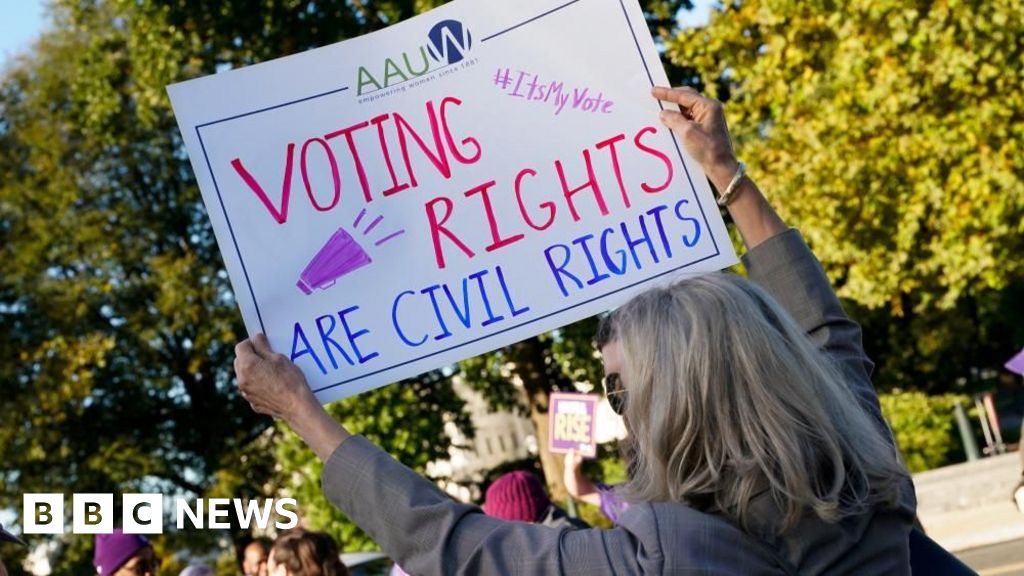Supreme Court Case Could Transform Southern Electoral Politics
On a seemingly ordinary Wednesday, the Supreme Court’s chamber buzzed with tension as justices deliberated a case that could reshape the electoral landscape of the American South. Outside the court, protesters voiced their concerns, embodying the stakes involved in a topic that has long sparked fervent debate: voting rights.
A Challenge to the Voting Rights Act
At the heart of this legal battle lies a significant challenge to the Voting Rights Act of 1965—a landmark piece of legislation designed to protect the electoral power of Black Americans against state-sanctioned discrimination. The court’s session, originally slated for just one hour, extended beyond double that time as justices eagerly questioned the attorneys involved, indicating the complexity and high stakes of the arguments presented.
If the challenge succeeds, it could pave the way for redrawing congressional districts throughout the South. Some estimates suggest that such changes might flip over a dozen seats from Democratic to Republican control, potentially giving the GOP a crucial advantage ahead of the midterm elections.
Historical Context of the Voting Rights Act
The Voting Rights Act was enacted to eliminate racial discrimination in voting. Specifically, Section 2 prohibits states from denying or restricting voting rights based on race, color, or the preferred language of voters. Over the years, the Supreme Court has interpreted this provision to necessitate the creation of “opportunity districts.” These districts allow sizable minority populations to elect representatives in a manner that reflects their proportion of the state’s demographics.
In Louisiana, Black residents comprise approximately 31% of the state’s population, yet only one of its six congressional districts has a Black majority. Advocates argue that this stark disparity underscores the need for additional majority-minority districts, reinforcing the initial intentions of the Voting Rights Act.
Shifting Perspectives on Redistricting
Historically, the Supreme Court has approached cases like Louisiana’s cautiously, routinely upholding the creation of majority-minority districts. However, the current conservative majority, which has shifted its focus, opted to use the Louisiana case to explore whether Section 2 of the Voting Rights Act itself violates the Constitution. The state, once defending its districting decisions, has suddenly shifted stance, arguing for the removal of racial requirements altogether.
The Trump administration’s involvement in the case further amplifies its importance, advocating for similar changes to the electoral map.
Potential for Catastrophic Consequences
During the oral arguments, Janai Nelson, representing the Black voters of Louisiana, cautioned that overturning Voting Rights Act protections could lead to “pretty catastrophic” outcomes. She emphasized the significance of these protections in cultivating the diversity seen across the South today, driven by litigation that mandated the establishment of opportunity districts.
Conversely, Louisiana’s Solicitor General, J. Benjamin Aguiñaga, countered that using race as a factor in districting amounts to discrimination and breaches constitutional principles. He articulated a legal standpoint recently echoed in other high-profile cases regarding race-conscious policies.
An Uncertain Future for Voting Rights
As discussions continue, the eventual decision by the Supreme Court remains highly anticipated. The day’s arguments indicated a possible majority inclined toward modifying established interpretations of the Voting Rights Act. Justice Brett Kavanaugh, often considered a swing vote, expressed concerns about the permanence of the law’s minority district requirements, echoing a previous Supreme Court ruling that diminished federal oversight of voting changes.
This legal discourse echoes broader national tensions in an age of highly partisan redistricting, where both Democratic and Republican states manipulate electoral maps to secure advantages. Recent instances have illustrated how such gerrymandering runs into conflict with the protections enshrined in the Voting Rights Act, particularly as minority voters historically lean Democratic.
The Implications of Racial Gerrymandering
The arguments surrounding race-led districting are not merely academic; they underscore the real-world implications of electoral strategies. Critics argue that current protections effectively safeguard against what they term “reverse partisan gerrymandering,” whereby districts are drawn to maintain Democratic representation among Black voters—a luxury not afforded to white voters in certain states.
As the Supreme Court deliberates, observers remain acutely aware of how quickly electoral dynamics can shift, especially if the conservative majority chooses to upend standards that have governed minority districting for decades. The outcome is likely to have far-reaching ramifications, not just for Louisiana but for states across the South and beyond.
While the court’s ruling may take months, the conversations around redistricting and voting rights are already igniting passions and policies designed to influence future elections. This pivotal moment serves as a reminder of the ongoing struggle for electoral equity in the United States.



